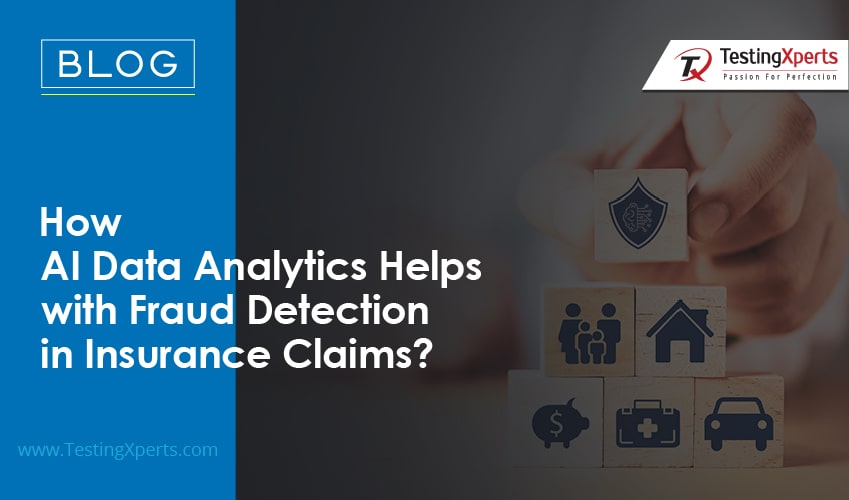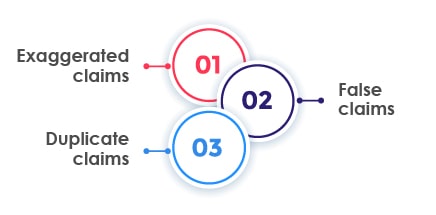Recommended Blogs
How AI Data Analytics Helps with Fraud Detection in Insurance Claims?

- Role of AI data analytics in the insurance industry
- Types of Insurance claims frauds
- Problems with traditional fraud detection methods
- How AI data analytics helps in fraud detection?
- Business outcomes for the Insurance industry with AI data analytics
- Top AI Trends Transforming the Insurance Industry
- Conclusion
- How can Tx help?
Insurance companies worldwide have been put to the test since the pandemic hit the world. With the increasing difficulty in predicting and segmenting claims, many insurers have fallen behind, allowing people with ill intentions to carry out frauds without detection. AI data analytics is the key to reducing the frequency of insurance fraud detection and the cost of fraudulent claims raised against insurance policies.
Insurance businesses now proactively leverage artificial intelligence (AI) algorithms to identify fraudulent activities or unusual claim requests. With AI and ML-based technologies, insurance companies monitor potential fraudulent activities continuously through AI data analytics and automate critical tasks, including claims management.
Role of AI data analytics in the insurance industry
As the endless amount of customer data piles up, there is no denying the fact that insurers are overwhelmed by disorganized and fragmented data that never seems good enough to be used effectively. The problem isn’t the data itself—it’s how it is analyzed, how quickly it becomes outdated, and how resources are wasted on deciphering patterns without automation.
AI helps insurance companies detect fraud as it occurs and connects data sets that would usually be siloed. The rightful implementation of AI and data analytics gives insurance organizations better control over fraud prevention. AI data analytics provides context regarding the behavior and patterns that may be new to the system. This way, insurance companies focus on customer profiles as investigators and can identify any fraudulent activities as it happens quickly. At the same time, AI data analytics continues to identify legitimate claims and offer a seamless customer experience.
As insurers gain an accurate, contextual, and holistic view of the data, they are in a position to use this information more effectively and take effective business decisions. AI-based data analytics also frees up resources responsible for handling complex data and allows them to be assigned to complex investigations.
Types of Insurance claims frauds

Unfortunately, fraud is a common phenomenon in all insurance sectors, including medical, auto, and home. Most prominent insurance companies know that insurance fraud occurs, but lack the resources to detect and investigate all potential fraudulent claims.
Among the various types of insurance frauds, the most common ones include:
Exaggerated claims:
In this case, the insured person raises the claim value unethically. For example, someone raised a claim of a stolen car for $10,000 when it was worth a fraction of that.
False claims:
During false claims, the insured person makes up a false story of an incident that never occurred, such as an accident or a theft.
Duplicate claims:
In duplicate claims, the insured person raises more than one claim from the same insurance provider for the same service date and incident.
Problems with traditional fraud detection methods
The traditional approach for fraud detection is based on developing heuristics around fraud indicators. Based on these heuristics, a decision on fraud would be made in one of the two ways. In certain scenarios, rules would be framed to define if the case needs to be sent for investigation.
In other cases, a checklist would be prepared with scores for the various fraud indicators. An aggregation of these scores, along with the value of the claim, would determine if the case needs to be sent for further investigation. The criteria for deciding indicators and the thresholds will be tested statistically and periodically recalibrated.
The challenge with the above approaches is that they rely very heavily on manual intervention, which leads to the following limitations:
• Constrained to operating with a limited set of known parameters based on heuristic knowledge – while being aware that some of the other attributes could also influence the decisions
• Inability to understand context-specific relationships between parameters (geography, customer segment, insurance sales process) that might not reflect the full scenario. Consultations with industry experts indicate that there is no ‘typical model,’ and hence challenges to determine the model specific to the context are essential.
• Recalibration of the model is a manual exercise that must be conducted periodically to reflect changing behavior and ensure that the model adapts to investigation feedback. The ability to perform this calibration is challenging.
How AI data analytics helps in fraud detection?
AI and machine learning tools help spot unusual patterns unnoticeable by the human eyes. For instance, reviewing any insurance claims compares the new claims to the existing data and helps to detect fraudulent and non-fraudulent claims. It continuously monitors customer behavior and analyzes the patterns. If a customer raises an insurance claim, AI looks for patterns first. If there are any unusual patterns detected, the system raises a flag by pointing out odd claims and highlighting them for the necessary investigation. Hence, without human intervention, it will analyze the claims and help reduce fraud.
AI algorithms are able to easily detect suspicious patterns among millions of insurance claims, allowing the insurers to analyze the requests in real-time. Among the many benefits of AI data analytics in insurance companies, claims fraud detection is undoubtedly a groundbreaking technology enabling firms to modernize their existing processes, increase operational efficiency, and lower overhead costs.
Business outcomes for the Insurance industry with AI data analytics

Top AI Trends Transforming the Insurance Industry
Artificial Intelligence enables transformation across various sectors, and the insurance industry is no exception. Insurers leverage AI to streamline processes, deliver better customer experiences, and make more informed decisions. Let’s look at some top AI trends that are reshaping the insurance industry:
Hyper-Personalization
One of the most significant trends driven by AI is hyper-personalization. AI-powered technologies enable insurers to offer highly personalized services based on customer needs and preferences. These include customized policies, pricing models, and even communication strategies.
AI allows insurers to analyze vast amounts of data and draw insights about customer behaviors, risk profiles, and preferences. These insights can tailor products and services to each customer’s unique needs.
Data Explosion from Connected Devices
The interconnection of connected devices, often called the Internet of Things (IoT), generates vast real-time data. AI is at the forefront of helping insurers make sense of this data deluge. Each device provides valuable data points for risk assessment, pricing strategies, and claim processing, from wearables and smart home devices to connected cars and industrial sensors.
Extended Reality
Extended Reality (XR), which is the combination of Virtual Reality (VR), Augmented Reality (AR), and Mixed Reality (MR), is another trend transforming the insurance industry. XR technologies and AI are paving the way for immersive and interactive experiences. In the insurance sector, these technologies can be used for training purposes, risk assessment, and even improving the customer experience.
Data Precision
Data is the lifeblood of the insurance industry, and AI is enhancing the precision of this data. Using machine learning algorithms, AI can sift through vast amounts of data, detect patterns, and extract precise insights. These insights can then inform underwriting decisions, pricing models, and risk management strategies. AI can analyze data to identify unusual patterns or discrepancies indicating fraudulent activity, enabling insurers to address such issues proactively.
Conclusion
Insurance frauds create alarming financial risks for Insurance companies – that’s why they should take up proactive measures to strengthen their fraud prevention methods. Technologies such as AI, ML, and predictive analytics are now being adopted aggressively in the insurance industry, helping Insurers in the overall business transformation. Effective implementation of these latest technologies offers a strong ROI in fraud analytics because these technologies enable insurance businesses to overcome fraud leakage in the claims area.
How can Tx help?
TestingXperts (Tx) is extensively helping global insurance companies in their digital transformation and allowing them to provide unmatched customer experience. Tx’s testing services portfolio and unparalleled track record have proved it a preferred technology partner for insurance clients.
TestingXperts understand the prerequisite of the industry and support you via customized testing solutions such as:
• Functional & Automated Testing
• Mobile App Testing
• Database Testing
• Integration Testing
• Security Testing
• Accessibility Testing
• Usability Testing
• Performance Testing
• ETL Testing
• Insurance Test Center of Excellence (TCoE)
We have extensive domain expertise across various segments of the Insurance sector like Life, Property and Casualty, Auto, Travel, etc. Our proprietary IPs & tool-agnostic test automation framework ‘Tx-Automate’ help reduce testing efforts by 30%-40%.
Discover more
